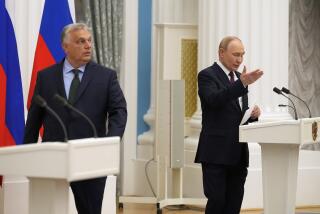Clearing the Air in Europe : Soviet Bloc: Regular dialogue between East and West about the dramatic changes in Europe could prevent discord between Washington and Bonn.
East German leaders have learned what the Chinese discovered in June: that visits by Soviet President Mikhail S. Gorbachev can challenge the legitimacy of communist regimes. In both cases, anticipation of his arrival helped produce mass demonstrations by people seeking glasnost and perestroika. In both, confrontation between leaders and led followed his departure. Yet events in East Germany are especially ominous, because they are taking place in the most heavily armed region on Earth and could undermine Gorbachev at home.
For months, the West has watched in wonder as Kremlin leaders have tolerated increasing latitude for East European states and even some Soviet republics. Solidarity now leads Poland. The Hungarian Communist Party has voted itself out of existence. Latvia has adopted independence as its goal. But tolerated is the key word. At some point, wonât the Soviet Union see fundamental threats to its security and respond accordingly?
Historically, that question applies with greatest force to Germany.
At first, Gorbachev seemed to give his blessing to the exodus of East Germans, roundabout through West German embassies in Eastern Europe. He apparently calculated that only reformist leadership in East Berlin can provide long-term stability. By last weekâs visit, however, he was openly counseling his East German disciples to be patient, while tacitly supporting the discipline that would inevitably follow his departure.
During the depths of the Cold War, Western observers would have been unstinting in praise of courage shown by East German emigres and protesters. Now, when so much seems possible in Eastern Europe, there is ambivalence in the West. Surely, the reasoning goes, Moscow will not abdicate a decisive role in the future of Germany, nor could Gorbachev survive a critical challenge to Soviet interests there. But it is impossible to tell how far authority can deteriorate in the German Democratic Republic without Soviet action.
Yet the West cannot just hope for the best. While encouraging human progress, it must be prepared for the possible failure of reform and the renewal of East-West tensions. Two requirements stand out: to learn as much as possible about the thinking and likely behavior of the different actors--especially the Soviet Union; and to prevent a political rift between the two key Western allies, the United States and the Federal Republic of Germany.
In both cases, the direct approach is to talk about the future, but in both cases current means are inadequate. In confronting East-West change, the Bush Administration is naturally inhibited in its dealings with the Soviet Union; along that route lie charges of âanother Yalta.â Nor does any existing institution bring together representatives of enough governments to permit talks that convey political legitimacy and are sufficiently informative about developments.
To meet this problem, one institution could be summoned: the Conference on Security and Cooperation in Europe, which is not due to reconvene until March, 1992. This 35-nation forum is unwieldy, but within it confidential and wide-ranging discussions can properly take place among interlocutors from both East and West.
Recalled into permanent session, the conference could become a principal locus for exploring the latitude and the limits of change in Eastern Europe--particularly Moscowâs willingness to accept challenge to its regional primacy. Of course, much would remain unpredictable. But through constant conversation, East and West can at least minimize miscalculation and reduce the risks of tragedy that, remarkably, virtually everyone now wants to avoid.
Equally critical, the United States and West Germany must prevent discord that would leave them unprepared to deal with developments, for good or ill, in the Soviet empire. In recent months, there has been growing U.S. uneasiness about West German actions. Many American commentators have revived fears of German unity and economic hegemony in Europe. Some U.S. officials have privately questioned whether the Federal Republicâs foreign minister, Hans-Dietrich Genscher, is loyal to the West. And some congressional leaders have been harping on divisive issues, including West Germanyâs reluctance to see modernization of nuclear weapons. Predictably, the West German elite resents U.S. mistrust.
Rapport between Washington and Bonn is never easy. Differences of language and bureaucratic culture intrude; most Americansâ limited knowledge of Germany is a handicap. But when change impends in Europe, the U.S. and West German governments cannot countenance misunderstanding. Something special is needed, including permanent âopen linesâ between the two governments, teams of officials regularly working in each otherâs capital, and regular visits by members of Congress and the Bundestag.
Both the United States and West Germany--governments and peoples--must also accept a basic proposition: During the political earthquake in Eastern Europe, now spreading to East Germany, they will either regain confidence in one another or risk undermining security in Europe.
More to Read
Sign up for Essential California
The most important California stories and recommendations in your inbox every morning.
You may occasionally receive promotional content from the Los Angeles Times.










